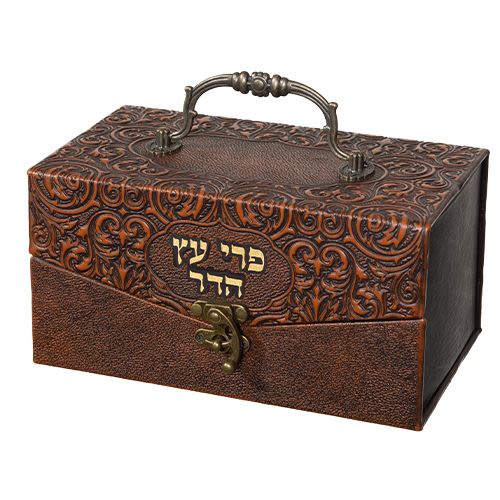
Matot-Masei: Purifying the Heart
The concept of Torah study and immersion in a mikva as conducive to purification of the heart permeate...

"And we brought an offering for Hashem; whatever each person found of gold vessels, anklet and bracelet, ring, earring, and clasp, to atone for our souls before Hashem" (Bamidbar 31:50).
The concept of Torah study and immersion in a mikva as conducive to purification of the heart permeate the writings of the holy Baal Shem Tov and his disciples. His great grandson, Rebbe Nachman of Breslev, teaches that in "spirituality, when one's thoughts are focused on the magnitude of Hashem and on His holy Torah, and move from one thought to another, a spiritual heat is created by the friction of the thought movement that is passed down to the heart and sets the heart ablaze in yearning for Hashem. This is the principle heat of the element of fire (Likutei Moharan I:156)".
The above concept is the key to a superb spiritual ploy for teshuva and soul correction, which works much the same as libun, literally "whitening", or koshering a metal utensil by heating it until it becomes red-hot in a fire. Once the metal object or utensil is red-hot, all non-kosher substances that may have been absorbed in that utensil become null and void, and the utensil is rendered kosher. According to Rebbe Nachman's principle, contemplating the magnitude of Hashem excites the heart and thereby creates a spiritual fire that burns away any forbidden thoughts that may have lodged in the heart. As such, contemplating the magnitude of Hashem is capable of "koshering" the heart the same way that a blazing flame dislodges and destroys absorbed non-kosher substances from a skewer or grill.
The ability of contemplating the magnitude of Hashem in purifying the heart has important and far-reaching ramifications. Contrary to what many think, a person doesn't have to subject himself to fasts and self-flagellation in order to purify the heart and get close to Hashem. On the contrary; by taking a walk in a lush green pasture, gazing at the royal-blue sky and contemplating the Creator of the sunset's dazzling gold and crimson rays, one's heart is kindled with the love of Hashem. A heart that blazes with the love of Hashem burns away the love of material follies and bodily lusts.
The Jewish commanders who led the attack on the Midianites were amazed with their own success in battle – not a single soldier of the 12,000-man task force was killed, wounded, or missing in action. As tzaddikim, they knew that Hashem was responsible for their amazing success. They contemplated the greatness of Hashem, and their hearts were set afire with the love of Hashem, and were completely purified. With the love of Hashem burning in their hearts, they came forth to offer the gold and valuables that were seized in the war as a gift to Hashem.
With Hashem's help, the following parable will help us understand how the impure elements are dislodged when the heart moves from one thought to another in holiness, especially while contemplating Hashem's greatness:
Stefan Ivanovitch was a brave Cossack officer whose black stallion was the most prized steed in all of the Ukraine. Stefan, like many of the other Cossacks, suffered from an acute habit of consuming too much vodka. More often than not, he was on the verge of inebriation.
Lonya, Stefan's steed, meant more to him than anything or anyone. Once, while Stefan was well into his second flask with his fellow officers, someone yelled, "Thief! Thief! He's running away with one of the horses." The dizzy Cossack officers trampled each other in their rush to the door to see whose horse was being stolen.
Trying to shake themselves from their drunken stupor, they took a fast inventory and realized that Lonya was the only missing horse. Stefan was seeing double, but he reacted quickly when a local yelled, "There's the thief!"
Stefan ran as fast as he could. Disoriented at first, he chased the thief with the best of his ability. Lonya cooperated, bucking and rearing under the thief. Stefan continued in hot pursuit, with the thief only a few hundred meters away. The thief grabbed the horse by the reins, and continued running away on foot. Stefan, nearly out of breath, broke out into a sweat that reeked of vodka. The more he chased the thief, the more the vodka left his pores. The more he ran, the more he sweat away the vodka, the more he sweat away the vodka, the more he sobered, and the more he sobered, the faster he ran. Soon, he nabbed the unfortunate thief and recovered his beloved Lonya.
Just as the Cossack's chase to recover his beloved horse quickly cleansed his system of the vodka, our thoughts that chase our beloved – Hashem, may His glorious name be blessed forever – create a flame of desire that descends to the heart and burns away all impurity. May we all merit to purify our hearts, and to make them a worthy chamber for the Divine presence, amen.
* * *
Parshat Masei – Life's Milestones
"These are the journeys of the Children of Israel" (i).
The Torah is neither a history book nor a biography of the Jewish people; the Torah is called "The Written Law" because it lists the six hundred thirteen commandments that govern how Jews must live their lives, as dictated from Hashem to Moses. One could therefore ask why the Torah lists every single journey. We know that the wisdom of the Torah is eternal; as such, what's the timeless message that we learn from the journeys of our forefathers in Sinai?
Rebbe Nachman of Breslov teaches (Likutei Moharan I:25) that the klipot – the husks of impurity that surround the holiness in each spiritual level – are "the fantasies, the musings, the lusts, the confusions, and the obstacles" of each spiritual level, which one can only overcome by pondering the magnificence of Hashem. "Know," says Rebbe Nachman, "that each and every world and each and every spiritual level has its own set of fantasies and so forth; when a person progresses from level to level, then he must necessarily traverse these fantasies [confusions, obstacles, etc. – LB] in order to reach the holiness, and as soon as he ascends to a new spiritual level, then the klipot in that level are aroused to surround him; one must then subdue them and shatter them, in order to purify the place [level – LB] from the klipot."
With Hashem's grace, if I'm not mistaken, the Torah's description of each of the journeys from place to place in the desert, together with the accounts of the trials and tribulations that the people of Israel experienced in each place on the way, allude to the individual spiritual odyssey of each Jew. We all can think back to the milestones of our first tender steps in this world, to the various stations of our journey through life that have led us to where we are today. In accordance with Rebbe Nachman's above teachings, we must necessarily struggle tenaciously through the klipot, the obstacles that try and prevent us from reaching the core holiness of each spiritual level. Our very task on earth is to bravely continue on our spiritual journey to perfect our souls and to attain proximity to Hashem by reaching the holiness of each spiritual level.
One may ask, "Why can't I live a life of leisure on a static spiritual level? Why must I be on the move my entire spiritual life?" The answer is simple – stagnant water becomes putrid, while fresh water flows. To reach one's goal of correction of the soul, one must make constant progress. With Hashem's help, the following parable alludes to the importance of life's journey in fulfilling our potential and correcting our soul:
Danoff was a wealthy merchant who had plenty of money. His lifelong wish was to retire, and to spend the remainder of his days in the Talmudic House of Study, indulging in the indescribable sweetness of Torah learning. Danoff knew that unless he trained his only son Izak properly in the fine points of trading and international commerce, his import-export business and fleet of ships would go down the drain. As such, he required his son to make a tedious journey that entailed performing a myriad of tasks on the way.
"Son," Danoff said, "I want you to embark from the port of Odessa and sail to Istanbul. Whatever our ship captain tells you to do, you must do! Remember, the fact that you are my son will not win you any special privileges until you complete the tasks I've planned for you; ultimately, if you perform your job well, I shall step down and turn everything over to you – your reward shall be great!"
The journey from Odessa to Istanbul was unbearable. The waters of the Black Sea frothed in stormy fury. Izak was sick to his stomach the entire journey. To make matters worse, he was forced to do the most menial tasks on board, from cleaning the sanitary facilities to lifting heavy crates.
A telegram from his father awaited Izak in Istanbul, ordering him to purchase a very special type of silk at a given quality at a certain price. Izak was lost in the labyrinth of Istanbul's many market places. He found tens of different types of silk, but none at the quality and price that his father requested. After three weeks of futile searching, he almost gave up. "Don't be discouraged," he told himself, "father is counting on me!" The very next day, he found the exact goods that his father wanted.
On his way to Athens, Izak barely escaped a band of robbers. In Italy, he received another telegram from his father, sending him to Switzerland. There, Izak became acquainted with the world of banks. From Switzerland he traveled to Paris, by this time a full year away from home. He had worked on his father's ships, bought, sold, traded, imported goods and exported goods, all to his watchful father's complete satisfaction. Once Izak had proven himself in every area, he was ready to come home to Odessa. His father gave him a hero's welcome, and happily turned the entire business over to him. Izak had everything he ever dreamed of for the rest of his life.
Just as Danoff sent his son Izak on a difficult journey across Europe to learn the necessary skills of business management and to prove himself, Hashem sends us – His children – on our journey through life in order to perfect our souls. By withstanding life's difficulties, trials, and tribulations, we attain our required "skills" of emuna in Hashem, for without this journey and its challenges, we'd never get to know Hashem nor make the spiritual progress needed to correct and refine our souls.
May Hashem help all of us to reach our personal destination, and our mutual destination to the Beis Hamikdash in the rebuilt Jerusalem, amen.










Tell us what you think!
Thank you for your comment!
It will be published after approval by the Editor.